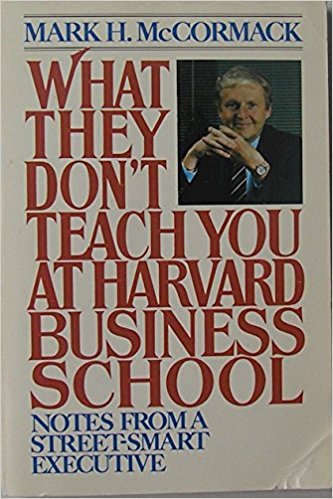Author: Mark McCormack
Genre: Autobiography, Management, Self-Help

Mark H. McCormack was an American lawyer, sports agent and writer. In the 1960s, Mark started his career in business (founded IMG, world’s leading celebrity management firm, with Michael Schumacher, Kate Moss and Pope as its clients) which was a huge success. He soon discovered that the most important thing an MBA can learn from Business school is an awareness of what it can’t teach you, for example how to read people and how to use that knowledge to get what you want.
Much to his dismay, Mark discovered that an expensive, advanced degree or High IQ does not always equal to ‘street smarts’. In this book he has tried to fill this gap between a B School education and the street knowledge required to deal and manage people day in and day out. This book is divided into three parts – how to read people, how to influence their reading of you, and how to apply both of them to any relevant business situation.
Part 1: People
- What people say and do in the most innocent situations can speak volumes about their real selves. In a business situation it is easy for people to adapt a personality and then change it according to the group of people they are with, but sooner or later you will find out what a person’s true nature is, either discreetly or out in the open. Business situations always come down to people situations.
- Use your insight, minute details about a person can be known just by having good ability to observe. A whole different level of personal dynamics is at work just beneath someone’s façade. The more you know about the person, the more accurately you can predict their reaction to different situations.

- Listen aggressively, listen not only to what someone is saying, but how he is saying it. People tend to tell you a lot more than they mean to.
- Observe Aggressively, look at the bigger picture, observing all the conscious and unconscious signals and getting usable perceptions from them.
- Talk Less, you will automatically learn more, hear more, see more.
- Ego, determine the strength of the person’s ego and understand its impact on your business, and use that information to your advantage. Also keep your own ego in check, as nothing blocks insight into other people more than your own ego.
- Take advantage of the venue, Business is a constant process of keeping your own guard up, while encouraging others to lower theirs. Usually, the less formal the situation or venue, the more likely people will be to let their guard down.
- Be detached, get back from a business situation, especially when it is heated, your powers of observation will automatically increase. When a personal is angry or upset he or she is going to be more revealing than at any other time.
- Creating Impression, it is little things you say and do that often make the most lasting impression. You are known by the company you keep, your secretary and the staff directly working for you are the mirror images of how the outside world sees you.
- Dress as though you mean business, the more conservative your business dress, the harder you are to read.
- Split some seconds, create such a situation that will showcase a split-second efficiency on your part like being precisely on time, meeting deadlines accurately.
- Don’t be a time thief, don’t waste others time by setting up a meeting just for making a contact.
- Your own turf, as a general rule you are far better off having meetings at your own office. There is a sense of invasion by other parties, the tension can be easily diffused by being polite, this can earn a certain amount of trust even before the meeting begins.
- Mean what you say, Business promises are made all the time, and almost as regularly broken leaving behind a horrible impression, if you say you will do something, do it. If you don’t want to do it, then don’t say you will. Make up excuses but never say, “I’ll try.”, leaving the other party with the impression that you tried and failed.
- Do something for the kids, if you have a client or customer to impress, do something for his or her kids. It will mean far more to your customer than almost anything you could do for him.
- Let People off the hook, recognizing circumstances where due to a variety of reasons beyond their control, people are no longer able to do agreed upon things, letting someone off the hook makes you accomplish more for yourself and your company in long run.

- Make Mentors: Mentorism is a matter of seeking advice and direction from someone you respect, soon the line between giving advice and doing you favor disappears.
- Being Yourself, everyone should have a basic set of principles by which he or she lives and conducts business. There is a huge difference between play-acting and miscasting yourself, the difference should be obvious, but if there is a confusion over when to play a role and when to be yourself, stick with the latter.
- Know the particulars, you can’t take an edge in any situation until you know the facts, but facts alone won’t guarantee you an edge though they can protect you from handing it to someone else.
- Know the players, the main idea behind reading people, sizing their ego, and finding their soft spots etc. is to use the information to your advantage – by revealing what you know about someone to the right stimuli.
- Size up the situation, take a moment to broaden your perspective towards the larger course, of setting any position into good or bad bracket.
- Thinking on your feet, act instead of reacting to a business situation. Exception to this being when there is a need to be opportunistic, to grab an edge to be taken advantage of immediately or it will disappear forever.
- How to get lucky, Gary Player once said, “The harder I practice, the luckier I get.” But over the years one must learn how to take advantage of the said luck, also implying that don’t wait for it to hit you in the face. “Getting Lucky” is mostly a matter of recognizing when you have been.
- Turn Crisis into opportunities, the best rule is when the crisis is occurring, don’t react. Just go with what you would like to think about it, analyze the crisis in terms of opportunities it poses as well as any underlying disasters and then respond to it.
- Learn to wait, bad news is rarely as bad as it first sounds, passing of time can totally alter the situation. Part of being opportunistic is waiting.
- Discipline Yourself, for being intuitive will only help you so much until you learn when to speak and act and when not to, usually known as business immaturity.
- For getting ahead you must know the rules
RULE 1: Survival of the fittest,
RULE 2: Your peers are your natural allies
RULE 3: There is always a system
Part 2: Sales and Negotiation
- Selling is most important. In last twenty years the quickest way to the top was considered through sales, today it is said to be through management training. But every at top management is known for his or her powers of persuasion, implying that to presume management skills obviate the need for skills in sale would be foolhardy.
- Selling is an intrusion. This feeling of intrusion can be turned into an asset. Effective selling is directly related to timing, patience, persistence.
- Fear. It is one single biggest problem that comes with selling, this fear of rejection and fear of failure while you are putting your ego on the line. Learning to accept the rejection doesn’t mean you have to like it, acknowledge your real feelings of frustration and anger instead of pretending they don’t exist. Fear of failure can be the biggest motivator in business. If you aren’t afraid to fail, then you probably don’t care enough about the success.
- Postpone Instant gratification. One of the definite signs of business maturity is the ability to postpone instant gratification. No aspect of timing is more important than patience, adjust your timetable to suit others.

- Persistence. How many times you knock on and how many times you go back to knock again, but effective selling is also about the matter of quality of doors and when you choose to knock.
- Attention spans. Busy people have short attention spans, don’t drag your explanation, get to the point fast and accurately.
- Silence. Is what keeps you from saying more than you need to – and makes the other person want to say more than he means to.
- Know your product. Believe in your Product; Sell with enthusiasm, nothing can repel a potential customer quicker than a salesman’s lack of the familiarity with his products.
- Positioning. Figuring out what someone is really buying when they buy your product or services and then conveying those exact impressions and motivations to the buyer.
Part 3: Running a business
- Commit very early on to quality. This will help you get started on the right footing, this can be an absolute competitive edge, this will minimize bad decisions and maximize good ones in the future.
- If we have had a formula for growth it has been: start with the best; learn from the best; expand slowly and solidify our position; then horizontally diversify our expertise.
- Staying in business. Building a business and running one comes with two different sets of problems, as everything becomes harder in the latter situation. It’s hard to keep company’s momentum, to shift its growth speed, and it’s harder to make decisions.
- Don’t let the policy stifle the operation. Keep revising and updating the corporate policies to be in step with the company itself.
- Manage Unconventionally. Managing a mature company is a constant process of breaking the company’s conventions, as companies by nature are conservative and people resist change particularly in the working environment.
- Manage with confidence. The ability to delegate is what separates the good managers from the bad ones. Distributing responsibilities is easier said than done, as more than often ego gets in the way. It takes a confident person to have faith in people working for him to overcome the ego problems. Delegate what you can, not what you want to.
- Manage for consistency. Next to profitability, the most important goal a company should strive for is consistency. To manage consistency, you will have to behave consistently, this saves a lot of unnecessary anxiety in the people who are being managed.
- Dealing with employees. People aren’t inconsistent, but their behavior is. Managing for consistency where people are involved demands being ‘Consistently inconsistent’. In the real world no two people are motivated exactly in the same way, or by exactly the same things. Author believes in the following philosophy as far as people are concerned – Pay them what they are worth, make them feel they are important, yet make them think for themselves, and separate office life from social life.
- Know your competition. Never underestimate your competition. In business there is no end to the competition, there is always time for someone to catch up with you. The better you know your competition the better you will be able to dominate them.

- Getting things done. not having enough time to is one of the greatest reasons of frustration among executives. It always comes down to controlling your day rather than having it control you, of forcing your activities into the time available instead of expanding time to accommodate activities. The whole solution to mastering time is to do the things you planned on doing when you planned on doing them, and for no longer than you planned on doing them.
Why you should you read this book: McCormack has been an achiever (net worth $750m) without an MBA. Every single advice he offers is based on his practical experiences in running a company. The book is filled with many anecdotes that explain the thought process behind the lessons. It feels like a handy guide that might help us run an organization, covering every aspect of business. The book consists of a separate section for entrepreneurs too.
Goodreads Link: What They Don’t Teach You at Harvard Business School: Notes from a Street-Smart Executive by Mark H. McCormack | Goodreads

 This information will never be shared with third party
This information will never be shared with third party
Post A Comment
Want to join the discussion?Feel free to contribute!